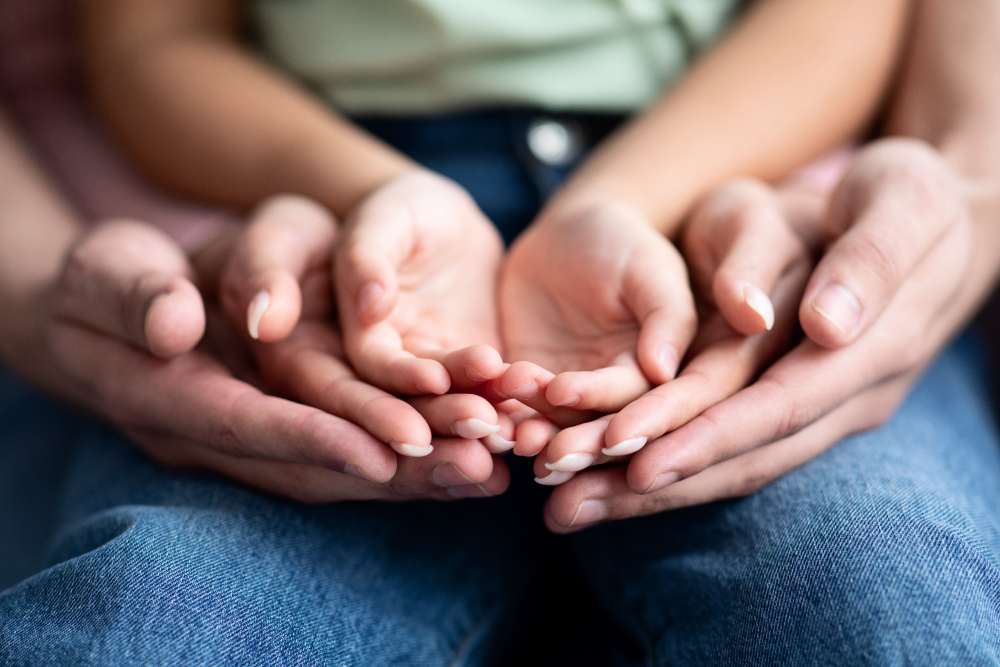Summer is filled with fun and games, but it also has frustrating moments. There’s often dysregulation in the house (tantrums, defiance, whining and disrespect.) Why is that? The sudden lack of structure over summer break can cause “bad behaviors” to emerge. The good news is we as parents and caregivers can do something about it. These parenting tips are tools to help you bond with your child and make summer fun again.
What’s Going on With Our Kids?
Every year, I count down the days until summer. But about 6 hours into summer break, reality hits. There are sibling fights, cries of “I’m bored,” and pleas for snacks every 15 minutes. Summer can bring unique challenges. If you are parenting a child that has experienced trauma, these challenges are often magnified.
Important connections between different parts of the child’s brain are largely formed during the first three years of life. When kids feel insecure and unsafe during this time, their brains learn to stay alert and anxious. The kids are watching for danger and trying to stay safe on their own. Because of this, our children are particularly sensitive to changes in their environment. Thankfully, there are some effective tools to help children who are dealing with foster care, adoption, and kinship care.
Parenting Tips
Our kids’ bodies perceive new and different experiences as a threat. When they don’t know what is coming next, their bodies stay hypervigilant, extremely cautious. The great news is, there are many simple ways that we can increase predictability and structure for our children. This will increase their felt safety.
For this parenting tip, remember the acronym SAFE:
Schedules, even simple ones, can go a long way to helping calm our children’s nervous systems. If you have older kids, create the schedule together. Start with a list of activities you want to include in the day and arrange them in a way that works for your family. Ideas include chores, snack/meals, free play, arts and crafts, school review, outdoor time, classes/camps, and screen time.
Keep the weekly routine the same. However, you can vary daily activities. A parenting tip to remember: try to “stack” activities strategically. For example, don’t plan chores after screen time or you will have meltdowns every time. What kid wants to turn off the tablet to clean toilets? Instead, transition from screens to something the kids will also like such as snack time or family outdoor time.
It is very helpful if this is available visually through a printed or picture calendar. Try to create at least 1-2 daily “anchors” that are the same each day – this could be an afternoon nap/quiet time or daily family walk.
Alert your child often to “what comes next.” This could be a family meeting weekly to go over next week’s schedule or a quick review of what to expect the next day.
Throughout the day, alert kids to transitions in advance. I will often give 10, 5, and 2-minute warnings before changing activities. Make sure there is eye contact when you give these warnings and remind them of the behavior that you want to see when it is time to transition to the new activity. “In 5 minutes, we are going to turn off tablets and have a snack. I have a yummy snack waiting for you! Make sure you don’t let the whine monster slip out when it’s time to turn off tablets!” This helps set expectations in a playful way.
Focus on connection. Quality is much more important than quantity. Summer is so long that we tend to put things off for later. But we need to be careful to make this time “count” to our kids.
Carve out at least 20 minutes a day to be fully present with your kids – no phone, no work, no distractions. Use this time to allow them to take the lead; do something they enjoy with you. The goal of this time is that your child knows you delight in time with them because you delight in them.
Empower your kids’ bodies for success. Kids need water and food every 2 hours to function best. This can be frustrating for parents in the summer as it feels like a full-time job. Make it simple with individual water bottles. Have a healthy snack cupboard and drawer in the refrigerator. It should be easily accessible and filled with snacks that your kids can get for themselves. Make sure to schedule in time for them to move their bodies. When kids get regular physical activity, they are calmer and better able to control their impulses.
Families often express that these habits “feel like a lot to do.” I would encourage you to think about how much time you spend breaking up fights, getting snacks, and dealing with meltdowns on any given day. It is typically a pay now or pay later situation. However, when we are proactive, it reduces feelings of frustration and conflict. Kids who feel safe with structure, predictability, and consistency can connect, play, and develop.













